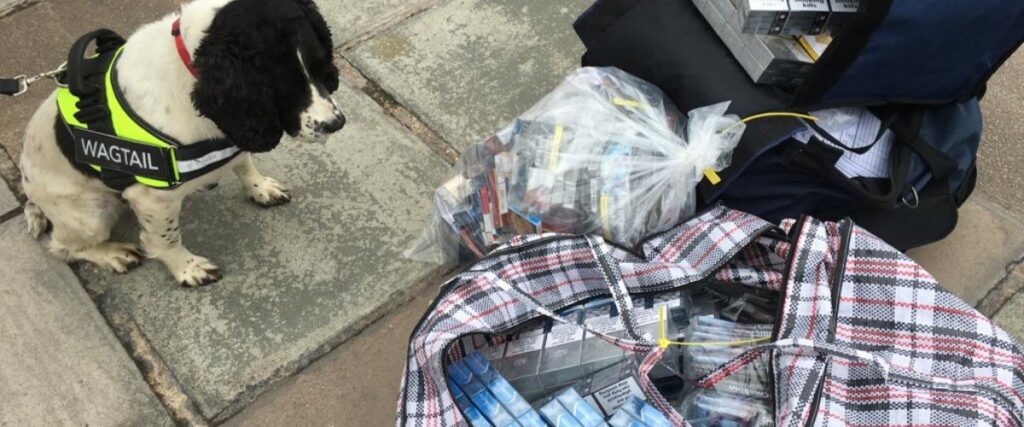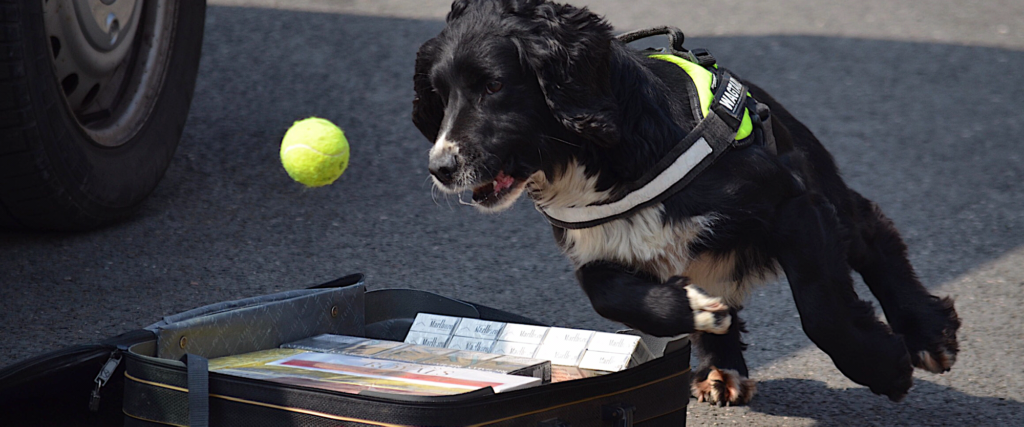As the illegal tobacco landscape evolves, illegal traders find new and often bizarre ways to conceal illegal hauls. To ensure that detection dogs are equipped to sniff past sophisticated means of concealment, they are selected and trained by specialist dog handlers. But how are they selected? And how are they trained?
In this case study we sit with Collin Singer, Managing Director of Wagtail, an international award-winning organisation which specialises in detection dogs and handler training. Wagtail has assisted in over 180 illegal tobacco disruptions under Operation CeCe, a UK-wide Trading Standards and HMRC initiative to tackle illegal tobacco market. Wagtail has trained illegal tobacco and cash detection dogs (often called sniffer dogs) for nearly 12 years.
What makes an effective crime fighting sniffer dog?
It all begins with selecting the right dog, as this is crucial. Our dogs are often described as having a high drive, confidence, and lots of energy, which makes them perfect for this line of work. In the field, you never know how long detection work will take, so these attributes are key for success.
We commonly select Labradors, Springer Spaniels, and Cocker Spaniels. These breeds have an amazing willingness to work, along with the intelligence and determination that is needed from an effective sniffer dog. They are typically resilient, passionate, and thoroughly enjoy the challenge.
Once picked, we then assess the dog’s confidence and ability to cope with new environments. The illegal tobacco market is considerably varied, and our dogs can face a whole host of challenging situations on operations. In addition to this, they also have to be friendly and sociable with other dogs and people. So, there is a lot to consider before training even begins!
What does training en-‘tail’?
Training is crucial to everything we do in carrying out illegal tobacco operations. During training, our dogs are exposed to as many different environments and scenarios as possible. This ensures that the dog is adaptable and flexible to new situations.
It takes several months to train a Wagtail detection dog. The actual training time depends on the specific dog and how long it takes to learn and progress. Our team of highly experienced trainers ensure that the highest of standards are attained before operational deployment.
A key element of training is ensuring that tasks are stimulating and fun. The dogs are really smart, so they enjoy the challenge!
In my experience, gone are the days of a few illegal cigarettes under the counter, as illegal hauls are now hidden through a whole host of sophisticated concealment measures. Often, these measures try to throw our dogs off the scent. As the market evolves, so must our training.

What is life like away from illegal tobacco operations?
Wagtail currently have ten fully trained, operational illegal tobacco detection dogs. Each of our tobacco detection dogs handlers work with two dogs each. We ensure that every dog in our care is given excellent, fulfilling lives and an opportunity to reach their full potential. A dog’s welfare is paramount to everything we do at Wagtail. Outside of work, our dogs have ample spare time for woodland walks, beachcombing, and adventures in the hills.
Some of your dogs are rescued?
Yes, six of our dogs are unwanted pets or are from dog rescue organisations. As I mentioned before, we pick working breeds who need a considerable amount of stimulation, exercise, and attention. Unfortunately, previous owners may not have had the time or capacity to give these dogs the attention needed for them to live fulfilling lives.
Is it fulfilling seeing a rescue dog adapt to detection work?
Absolutely! The breeds which we select have a natural instinct to hunt and find. We are converting that natural instinct into a game for them. It is very rewarding for us to do this: to be able to take a dog that may be unwanted and train them into a ‘crimefighting sniffer dog’. Ultimately the dogs enjoy this role and all it entails, otherwise they wouldn’t do it! It is extremely rewarding seeing a rescue dog evolve and flourish into a fully trained dog.
Can you relay some of the team’s recent work?
Our dogs often assist Trading Standards Officers by searching an area much more quickly and accurately than human search teams. For example, we recently searched a self-storage establishment that had over 2,000 units spread across five floors. Our dogs are trained to screen the units for the presence of a tobacco scent. As you can imagine this would be a near impossible task for Trading Standards Officers, but our dogs can search the units pretty efficiently. In this example, our dogs detected over two million cigarettes and several tonnes of tobacco. It was a great find for the team!
Any proud moments within Operation CeCe?
We have had several significant and proud moments within Op CeCe! Under this operation we have helped detect several million illegal cigarettes, and several tonnes of illegal hand rolling tobacco. Recently, in a multi-agency operation, we deployed multiple dog teams over 3 days, resulting in over 1 million illegal cigarettes being seized. We cannot name the locations as investigations are still ongoing.
During Op CeCe we have also helped to uncover some clever and sophisticated means of concealment. For example, we have found illegal tobacco hidden in electronic devices, which utilise electromagnets that are operated by remote controls. These have been seen to help conceal illegal tobacco in ceilings, walls, and floors. Furthermore, we have found illegal hauls in drains, mirrors, microwaves, hoovers, clothing, and in many more bizarre locations. On numerous occasions officers have said, ‘we would never have found that without the dogs!’.
Do you train tobacco dogs for any other organisations?
Yes, in addition to our UK tobacco detection dog teams, Wagtail also trains handlers and dogs for a customs organisation in the European Union. These dogs are trained to detect illegal tobacco, cash, and drugs. We have also trained dogs for them to detect products of animal origin. These teams continue to have significant success, highlighting the effectiveness of highly trained dogs.
What happens when the dogs get older? Do they retire?
When the time comes to retire, a loving home is carefully chosen by our dedicated rehoming centre, Redpaw Rehoming. The dogs may be rehomed with their handler, another member of staff or even officers from Trading Standards or HMRC.
After 5 to 7 years of service with Wagtail, we owe our dogs a loving home and a well-earned retirement!
Any final words for anyone reading this?
Yes, we would say that illegal tobacco remains a significant problem in Wales, and throughout the rest of the UK (we see illegal activity first hand!). Operations rely on intelligence, so I would urge anyone reading this to use this website to anonymously report sales in your area.
Reports not only help intercept illegal traders, but also help our dogs do what they do best: sniffing out illegal tobacco from our communities!
If you suspect or know of any sales of illegal tobacco or vapes in your area, you can report them anonymously HERE.


